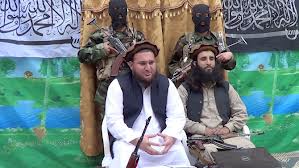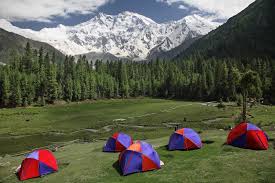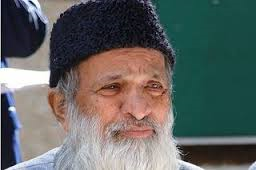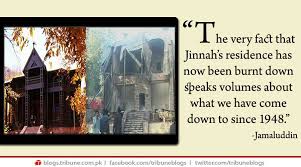While the United States and Israel incessantly obsess with the possibility of a future nuclear Iran, they barely ever raise such concerns about Iran’s next door Islamic neighbour Pakistan that brandishes its nuclear weapons with Islamic zeal and barely concealed contempt for the “kufaar” — Jews, Christians, Hindus, atheists and other non-Muslims.
But there are others inside Pakistan who do not share America and Israel’s myopia. The country’s leading anti-nuclear activist, physicist Pervez Hoodbhoy in his book Confronting the Bomb, has this to say about Pakistan’s nukes:
“The fear of loose [nuclear] weapons comes from the fact that Pakistan’s armed forces harbour a hidden enemy within their ranks. Those wearing the cloak of religion freely walk in and out of top security nuclear installations every day … The fear of the insider is ubiquitous and well-founded.”
Prof. Hoodbhoy is able to see through the complexity of his country’s nuclear arsenal that both the White House and Jerusalem either choose to overlook or are grossly ignorant about. Hoodbhoy maintains that there are two Pakistani armies. One led by General Pervez Ashraf Kayani and the other by Allah. “It is difficult to find another example where the defence apparatus of a modern state has been rendered so vulnerable by the threat posed by military insiders.” Even non-fundamentalist elements are “soft Islamists,” he says. Hoodbhoy describes the Pakistani army as “a heavily Islamicised rank-and-file brimming with seditious thoughts.”
As a friend of the Jewish people as well as the Arabs, the thought of a nuclear devise exploding over Israel gives me the jitters. The fact is, millions of Arabs too will be eviscerated in a nuclear attack on the Jewish State.
In meeting with leading Jewish intellectuals and academia in North America and some in Israel itself, I am struck by the lack of knowledge they have about Pakistan, let alone its nuclear program. Few write about the internal dynamics of Pakistan that has emerged as the world’s number one source of jihadi suicide bombers and ground zero for the training of Islamic terrorists.
Pakistan is not an easy subject. It is a multi-ethnic country with a multi-lingual population dominated by Punjab; a civil war in Balochistan; a disputed border with Afghanistan; hundreds of thousands of troops on war footing at the Kashmir Line of Control against India; a slow slaughter of the country’s Shia population and China’s strategic interests at the mouth of the Straits of Hormuz.
All of this makes the study of Pakistan a daunting task for any outsider. Even Britain and the USA who helped create the country to install a buffer state between the advancing USSR and India after the Second World War, have not been able to read the tea leaves with any degree of accuracy.
As I write this essay, Pakistan produces more nuclear bombs than any other nuclear power while developing longer-range missiles. On paper, these nuclear warheads and missiles are India-centric and pointed towards the east. However, Pakistan’s nuclear arsenal is not at a static location and the warheads as well as missiles are constantly on the move, and if there is one country that the Pakistan’s politicians, both on the right as well as the left, hate more than India, it is Israel.
Are Israelis aware of the vulnerabilities in Pakistan’s nuclear program that make it possible for non-state jihadi actors to strike at the Jewish State? I doubt it.
Pakistan is a society based on the hatred of the “other.” Since its creation, the Hindu and the Jew, (“Hanood wa Yahood” in the popular street lexicon of the Urdu language) has been cultivated as the enemy of the country and Islam.
In a culture of violence, three million fellow Muslims were killed in genocide in 1971 in Bangladesh. With the liquidation of the Hindu population and the total absence of Jews, the addiction to killing the “other” is now consuming the Pakistanis from within.
Just in the three years leading up to the 2011 capture and death of Osama Bin Laden in Abbotabad, Pakistan, there were 225 suicide bombings in the country killing over 3,900 people, and all of them in politically motivated attacks by Sunni Muslim jihadis. All the victims — from Ahmadi Muslims to Shia Muslims — are accused of serving the Zionist cause and thus eliminated.
Shia vs. Sunni
The irony is that while Israel considers Shia Iran as its primary enemy and nurtures a cold peace with Jordan and Egypt, the Shias of Iran are often branded as a secret Jewish sect by Sunni Muslim clerics in both Egypt and Jordan. Jews around the world seem to oblivious to this fact as they read about the slaughter of Shias in Pakistan and the open hostility towards them from places as far apart as Indonesia to Indiana (home to America’s Islamist organisation ISNA ).
If one were to study the sources of Jew-hatred, they are invariably rooted in Pakistan and the Arab World. If it comes to terrorist attacks carried out around the globe, almost all of them have either originated in Pakistan, were carried out by young men of Pakistani ancestry or by jihadi terrorists who were trained on Pakistani soil. Else, they were planned and executed by Islamabad’s intelligence agency, the ISI and its sponsored terrorist organizations. Yet, in the eyes of Israel and the Jewish Diaspora, it is Iran that is the anti-Semitic capital of the world, hell-bent on destroying the Jewish State.
Let me catalogue the role Pakistan has played in international terrorism, long before its territory was used by Osama Bin Laden and Khaled Sheikh Mohammed to plan and execute the 9/11 attack on the United States.
International Terrorism linked to Pakistan
- September 1986: Armed men attempt to hijack a Pan Am jet on the tarmac of Karachi airport in which 20 people died. Among the arrested were five Palestinians belonging to the Abu Nidal group and seven Pakistanis.
- January 1993: The CIA headquarters in Langley, Virginia is attacked, killing two CIA employees and wounding three others. The perpetrator is a Pakistani, Ajmal Kansi. Four years later in 1997 he is captured by FBI agents in rendered back to the United States to stand trial and was executed by lethal injection in 2002.
- February 1993: The World Trade Centre is attacked using a truck bomb. The mastermind of the attack, Ramzi Yousef is later arrested in 1995 in Islamabad, Pakistan.
- August 1998: American embassies in Kenya and Tanzania are bombed, killing 223 people and wounding over 4,000 others. One of the planners of this terror attack,Ahmed Khalfan Ghailani is arrested in 2004 in Gujrat, Pakistan.
- October 2000: Jihadi terrorists carry out a suicide attack on the United States Navy guided-missile destroyer USS Cole while it is harboured and being refuelled in the Yemen port of Aden. Seventeen American sailors are killed, and 39 injured. The Saudi mastermind behind this attack, Walid Bin Attash is later captured on April 29, 2003 in Karachi, Pakistan.
- May 2002: A suicide bomber kills 11 French naval engineers outside The Sheraton Hotel in Karachi, Pakistan. Three years later the bomb maker, Mufti Muhammad Sabir is arrested 2005 in Karachi, Pakistan.
- October 2002: Jihadi terrorists attack the Indonesian tourist resort of Bali killing 202 people and injuring another 240. Nine years later, the chief suspect in the bombing, Umar Patek of the militant group Jemaah Islamiah is arrested in 2011 in Abbotabad, Pakistan.
- July 2005: Jihadi terrorists carry out the now infamous 7/7 suicide bombings in London, UK, killing 52 people and injuring 700 others. Three of the four suicide bombers are of Pakistani ancestry. In January 2009, one of the planners of the London 7/7 bombings, Saudi national Zabi uk-Taifi is arrested in a village just outside Peshawar, Pakistan.
- December 2008: Pakistani jihadi terrorists carry out a sea-borne suicide attack on Mumbai, India, killing 166 people including a rabbi and his pregnant wife at a Jewish Centre, and injuring 308 others. The mastermind of the Mumbai attack was the Pakistani-American David Coleman Headley (born Daud Sayed Gilani). His alleged Pakistani-Canadian accomplice, Muhammad Tahwwar Rana, was acquitted in the Mumbai attacks but convicted of working for the terror group, Lashkar-e-Taiba (LeT), long suspected of being supported by Pakistan’s ISI.
- May 2010: A bombing at New York Times Square is foiled when street vendors discover smoke coming from a vehicle and alert an NYPD patrolman. The bomb had ignited, but failed to explode, and was disarmed before it caused any casualties. Two days later federal agents arrest a man at John F. Kennedy International Airport after he tries to board an Emirate Airlines flight to Dubai. He is Faisal Shahzad, a 30-year-old Pakistani-American.
In addition to the above list of international jihadi terror attacks associated with Pakistan, the country has been home to most of the Al-Qaeda leadership, including Osama Bin Laden. They include the following five:
- Abu Zubaydah, a Saudi citizen currently held in U.S. custody, was arrested in March 2002 in Faisalabad, Pakistan.
- Ramzi bin al-Shibh, a Yemeni citizen being held by the United States as an enemy combatant detainee at Guantanamo Bay in Cuba. He was captured in September 2002, in Karachi, Pakistan.
- Khalid Sheikh Mohammed is currently in U.S. military custody in Guantánamo Bay for acts of terrorism, including mass murder of civilians, as he has been identified as “the principal architect of the 9/11 attacks”. He was captured in March 2003 in Rawalpindi, Pakistan.
- Abu Faraj al-Libbi is the nom de guerre of a Libyan who is a senior member of al-Qaeda. [His real name is thought to be Mustafa al-‘Uzayti.] Al-Labibi was arrested in May 2005 in Mardan, Pakistan.
- Mustafa Nasar, also known as Abu Musab al-Suri is a Syrian-born leader of al-Qaeda who holds Spanish citizenship. He is wanted in Spain for the 1985 El Descanso bombing that killed 18 people, and in connection with the 2004 Madrid train bombings. Nasar too ended up in Pakistan where he was captured in October 2005 in the Pakistani city of Quetta.
Not to mention the fact that the only time Britons have been involved in a suicide bombing attack inside Israel, it has involved men of Pakistan ancestry. In May 2003 a suicide bomber and his accomplice murdered three people and wounded scores at a Tel Aviv bar. The 21-year-old bomber, Asif Mohammed Hanif died in the attack while his accomplice as Omar Khan Sharif failed to detonate his bomb. Both were born to Pakistani parents in the U.K.
Hanif was not the first Pakistani-Briton to commit terror against Jews. In 2002, Omar Saeed Sheikh of London masterminded the kidnap and murder of Wall Street Journal journalist Daniel Pearl in Pakistan.
Compared to the acts of international terror that have a Pakistani link, terrorism that originates in Iran is few and far between.
The first international atrocity that can be traced back to Iran was committed in 1994 when the Asociacion Mutual Israelita Argentina (AMIA) Jewish Centre in Buenos Aires, Argentinewas bombed, killing 85 people and wounding 300 more. There is little doubt that senior Iranian officials were behind the attack and that their Lebanese-based Hezbollah allies carried out the attack.
The only other major act of Iranian international terror was in February 2012 when a bomb explosion targeted an Israeli diplomat in New Delhi, India.
Why Iran? Why not Pakistan?
Why then is Israel so obsessed with Iran, but not Pakistan? One of the reasons may be the presence in Israel of an influential Persian Jewish community with roots in Iran, and who have a particularly nasty experience with the regime of the Ayatollahs compared to the era when a close relationship between Israel and Iran existed during the reign of The Shah until 1979.
Iranian Jews in Israel are estimated to be 200,000 to 250,000 strong and have a far greater role in the country’s public policy making then their numbers suggest. From Dan Halutz , the former chief of Staff of the Israel Defence Forces (IDF) to the now disgraced former president of the country Moshe Katsav, Iranian Jews in Israel pull more than their weight in the affairs of the country.
Today the former Israeli Minister of Transport Shaul Mofaz, leads the Kadima Party while Michael Ben-Ari and Mordechai Zar are members of the Knesset.
Compared to Iranian Jews in Israel, Pakistani Jews do not exceed 2,000 in number, and their claim to fame is restricted to the introduction of cricket inside Israel. They mostly live in the city of Ramla and do not have any prominent figure in the Israeli political discourse. Few of these Pakistanis have any links or even memories of Pakistan and unlike their Iranian counterparts, lack any insight into the current political nature of their former homeland.
While Israel Radio runs a daily Farsi language service since the 1950s, it has no such broadcast in Punjabi, Urdu, Balochi, Puhstu, or Sindhi, the languages of Pakistan. It is no wonder that in Israel there is such a dearth of scholarship on Pakistan and that country’s involvement in international jihadi terrorism.
While the 180-million population of Pakistan and its diaspora is almost universally anti-Semitic and hostile to Israel, the ordinary Iranian is neither obsessed with Jew hatred nor seeped in convoluted theories of Jewish conspiracies that are ubiquitous among its next door Pakistani neighbours.
Israelis are justifiably worried with the rabid rhetoric that emanates from the Iranian ayatollahs. However, they need to recognise that it is Pakistan that has 100 nuclear warheads and missiles that can reach Israel, not Iran.
Obsessing with Iran while shrugging off the threats posed by Pakistan and its jihadi sponsor Saudi Arabia, may be a mistake that Jerusalem can still correct while it has a chance.
Already there are reports that Saudi Arabia’s former intelligence chief Prince Turki al-Faisal is in support of cooperating secretly with Pakistan in developing a Saudi-based nuclear program. This initiative has the backing of the current director of Saudi intelligence agency, Prince Bandar Bin Sultan.
srael needs to realize that Iran and Syria may be the dogs that bark, but it is Saudi Arabia and Pakistan who are the ones most likely to bite.




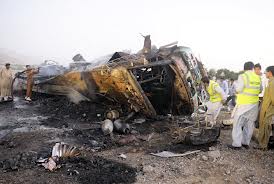

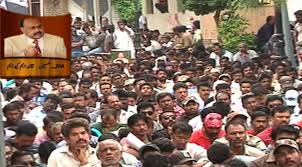

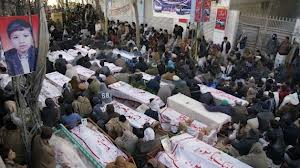
 QUETTA, June 30: At least 28 men and women of Shia Hazara community were killed and 60 others injured in a suicide blast in the Aliabad area of Hazara town on Sunday night. “A suicide bomber blew himself up near a barrier close to Ali Ibn-Abu-Talib Imambargah,” DIG (Investigation) Syed Mobin Ahmed told Dawn.
QUETTA, June 30: At least 28 men and women of Shia Hazara community were killed and 60 others injured in a suicide blast in the Aliabad area of Hazara town on Sunday night. “A suicide bomber blew himself up near a barrier close to Ali Ibn-Abu-Talib Imambargah,” DIG (Investigation) Syed Mobin Ahmed told Dawn.